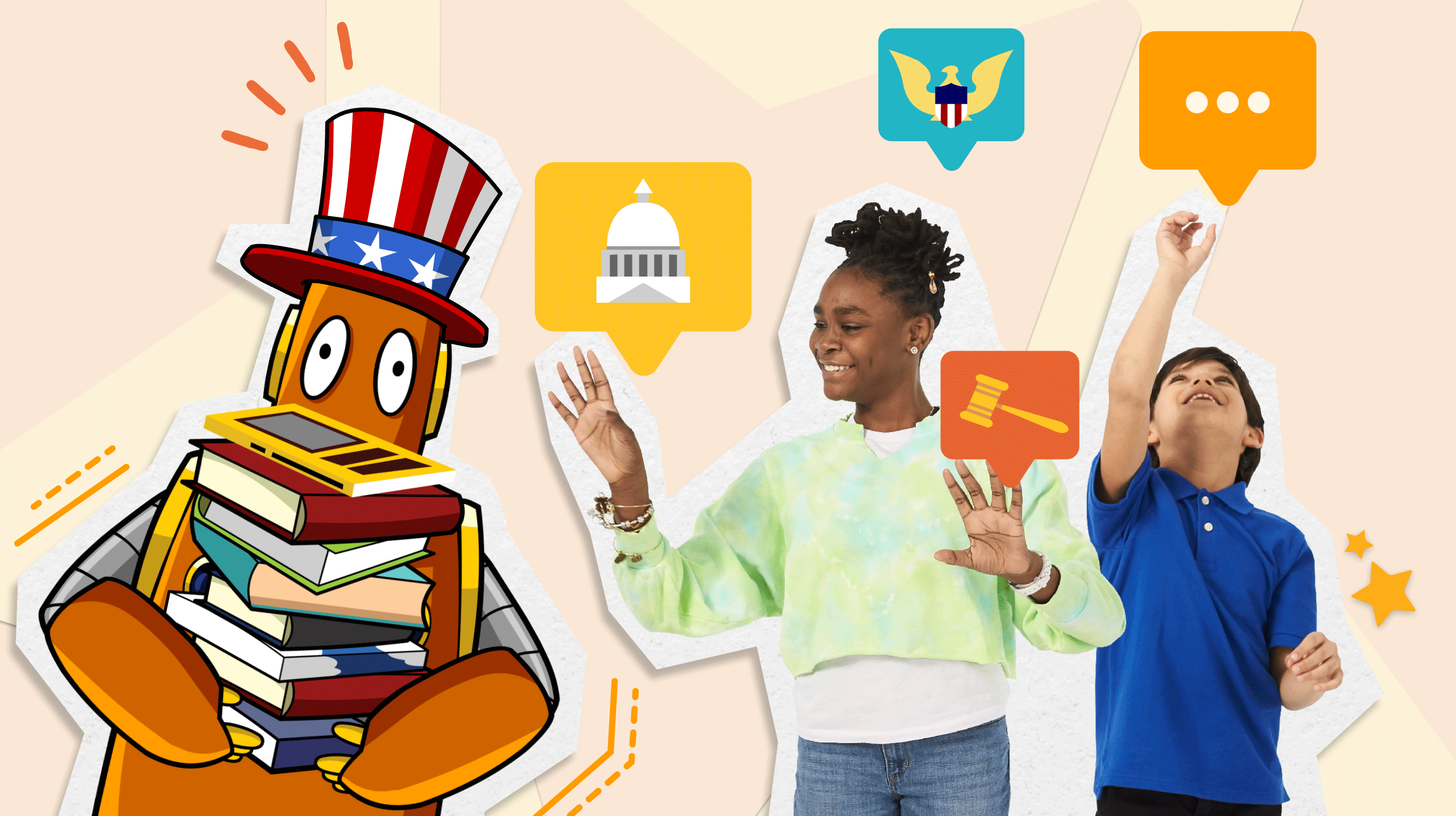Teaching Strategies
Why Teaching About Civics Matters—No Matter What Subject You Teach

Teaching something like civics can feel like an easy subject to veto—especially when there’s already so much to focus on, like reading and math (and science and social studies and writing and health and digital citizenship and…(you get it).
What if we told you that teaching civics can actually help you reach your instructional goals—while also helping students become better thinkers, more engaged learners, and empowered citizens? Well, it all comes down to one thing: background knowledge.
Help students become better thinkers with background knowledge
Cognitive psychologists have long known that knowledge makes more knowledge—that children who come into a text knowing something about its content have a much easier time comprehending and remembering it…making it easier for them to, in turn, acquire new knowledge and comprehend more things.
Students who know about the text’s topic need to spend less mental effort trying to infer meaning from more specialized, unfamiliar words—and can instead focus on the meaning and implications of the text as a whole. This means that students now have the brain space to make connections, analyze the content, and generally develop the comprehension and critical thinking skills we know are so important.
In other words: background knowledge not only helps us read and remember texts: it also helps us become better thinkers.
Benefits of incorporating civics knowledge into your lessons
Now, how does this apply to civics explicitly? Teaching civics knowledge—say, the branches of government, democracy, or citizenship—can help students:
Become more confident readers and writers:
More knowledge: When reading a passage about democracy (think: ancient Greece, American Revolution, standardized test passages), students with civics knowledge won’t have to guess what it means: they can confidently move on to the next word, sentence, then paragraph.
More vocabulary: Knowing domain-specific vocabulary and concepts like “election” and “senate” will help them understand other texts when those domain-related concepts come up (think: social studies, literature). Meanwhile, Tier 2 words like “veto” and “legislative” will help readers understand texts that aren’t about civics at all.
Improve critical thinking:
Making connections: When students digest and analyze concepts like government, democracy, and elections in one context, this thinking can help them analyze and make connections when it comes up in other contexts—say, when they learn about social studies (now and in future years) or hear the news at home.
More brain space for thinking: Because they have civics knowledge, they won’t have to spend time parsing out unfamiliar words and concepts: they can apply their knowledge to remember the new knowledge and practice skills like finding the main idea and supporting details.
Improve writing skills:
Thinking at the idea level: Writing helps learners make meaning of concepts. It forces writers to think beyond the word level and instead formulate a thought (and express it in writing) at the idea level.
- In other words, writing about democracy requires more depth of knowledge than simply reading about it.
More brain space for writing: But good news! Just like knowledge sticks, so too does critical thinking: if students have already remembered the concept of democracy—and have made connections and analyzed it—this will lighten their cognitive load enough to focus on expressing themselves in writing.
- So, combining writing practice with content knowledge isn’t just time-saving: it also boosts student confidence.
Feel more invested in their learning:
Pride at what they know: This might come as no surprise, but students feel proud of knowing things and understanding the world just a bit better! Background knowledge turns “What is that?” into “Did you know?”
Finding relevance everywhere: Because they have a wide base of knowledge from which to make connections, they can take charge of their own learning and find relevance in any topic.
From civics in the classroom to civic participation
This is perhaps the biggest benefit of all: in addition to helping students in school, civics education helps students outside of school. BrainPOP’s mission to empower students to understand the world around and within them—and civics is a prime example of this in action.
Understand the world around them:
Understand and interpret current events: Now that students have background knowledge in civics, they can use what they know to inform what they read about current events. When they read about current elections or government issues, they’ll be able to compare with their previous analyses and ideas about government and civics systems throughout history.
Use critical thinking when reading news: Having critical thinking skills in general is important when reading news online—but having critical thinking skills specifically related to civics is even better. When it comes to deciphering fake news from real news, nuance is important: and students with foundations in civics will have to do less mental work to understand the meaning of political text, and instead be able to focus on the finer points. They can read between the lines and understand what a text’s actually saying—not just what it seems to be.
Understand the world within them:
Form their own opinions: This is where it all comes together: students can use their background knowledge and critical thinking skills, to interpret current events… and form their own opinions.
Vote and engage in their community: And, because they know what voting is (and the importance of it!) they can vote on those opinions, and engage in their community in a way that aligns with their own internal compass.
Lead positive change through civic participation: From writing letters to elected officials or volunteering in their communities, students can feel empowered to take action on issues that matter to them when they have more civics knowledge to back them up.
Civics is more than just social studies content
Civics, then, isn’t just a matter of understanding isolated concepts: it’s important to help students inside and outside the classroom. Inside the classroom, civics knowledge helps with their reading, writing, and critical thinking skills—outside, it allows them to put those skills into practice to make their own decisions and act on them accordingly.
Want to get started on your students’ civics education? BrainPOP is your go-to place for building the background knowledge kids need to understand topics—and the skills students need to engage with them.






